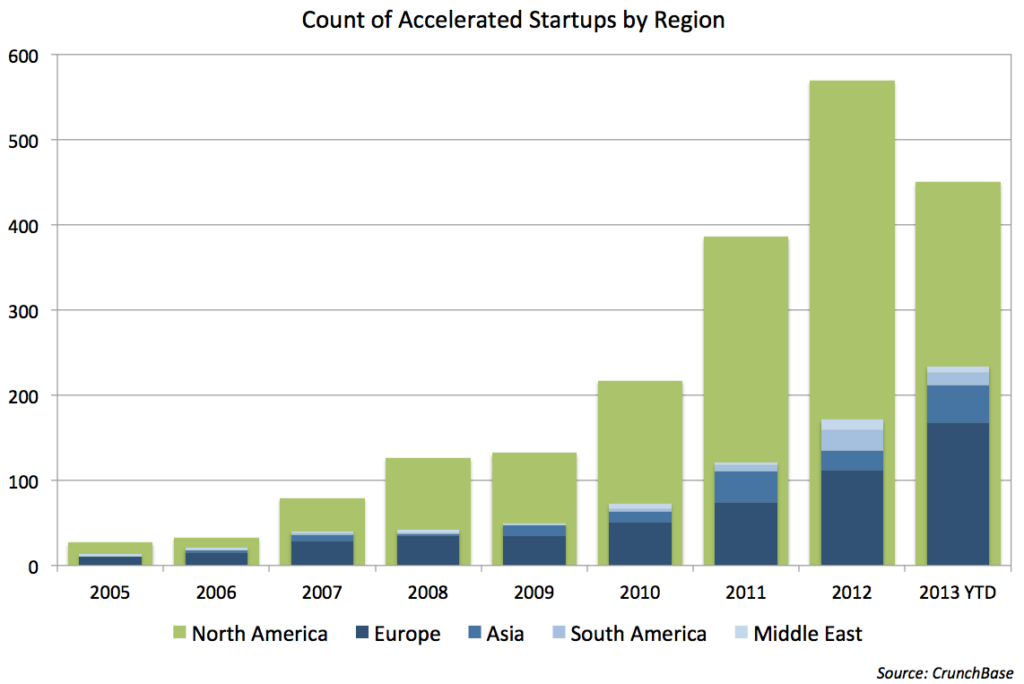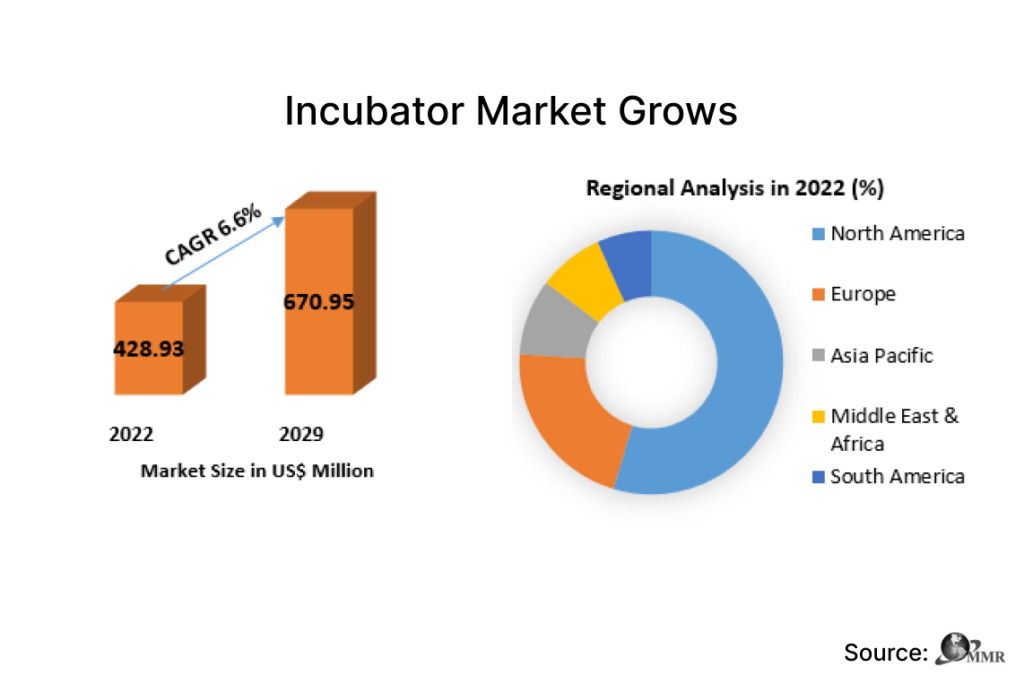Very often, even the most daring projects need outside help. It has become much easier to find it since the number of business incubators and accelerators has grown rapidly over the last few years.
While both play crucial roles in fostering innovation and driving early-stage ventures, they differ significantly in their approaches and offerings. They may have different reach, participation requirements and rules, philosophies, views on mentorship and networking, and bases for resources and funding.
In this article, we will try to describe the distinctions between these two concepts and explore the most striking examples of both. We will also provide insights on how to choose the right path for your startup journey and how to find the best support system for businesses from various industries and with various scales. Let’s start!
What is a Startup Accelerator?
A startup accelerator is an intense, structured, and time-limited program. It is designed precisely to accelerate the growth and development of early-stage startups and companies. Such programs offer a blend of mentorship, resources, and funding to drive startups towards success.

Startups admitted to accelerator programs receive mentorship from industry experts, access to a network of investors, and often a seed investment in exchange for equity. Organizations typically initiate accelerator programs in collaboration with investment firms, corporations, or educational institutions. It helps them find talents for creating needed tech products such as analytical tools, web applications, etc.
The primary goal of a startup accelerator is to provide selected startups with the resources, mentorship, and support needed to advance their business and increase the likelihood of rapid success. Such platforms can connect startups with large corporations (like Plug and Play tech center, for example).
Key characteristics of startup accelerator program
Let’s take a look at the main features of the accelerator program.
- Limited duration
Accelerator programs are relatively short-term, usually lasting for three to four months. Іtartups undergo an intensive and immersive experience and achieve specific milestones during this limited period.
- Curriculum and mentorship
A structured curriculum covering various aspects of business development is also a big part of startup accelerators’ approach. It can include product refinement, market strategy, financial planning, and pitching techniques.
Startups also receive mentorship from experienced entrepreneurs, industry experts, and investors. They guide them through challenges and provide valuable insights.
- Funding
The accelerator program typically provides tech startups with funding in exchange for equity. The amount of funding varies among programs, but it is intended to support the startup’s operations and growth during and after.
- Demo days
The accelerator program may often end with a ‘Demo Day,’ where participants can present their progress and pitch their businesses to a select audience of investors, mentors, and potential partners.
This event serves as a platform for startup founders to get additional funding and partnerships. Of course, the audience consists of those who are particularly interested in cooperation and are experts in a certain industry. Whether it is developing software for insurance or creating mobile e-commerce apps, the accelerator program always involves communication with relevant specialists.
Examples of startup accelerators
Of course, there are plenty of startup accelerators with different goals, programs, and directions. We will talk about some of the most striking examples.
Y Combinator
Based in Silicon Valley, Y Combinator is one of the most famous accelerators globally. Its slogan is ‘We give startups a disproportionate advantage.’ It has nurtured successful startups like Airbnb, Reddit, Dropbox, DoorDash, Stripe and many more.
Y Combinator runs a highly competitive and intensive three-month accelerator program. Startups receive seed funding, mentorship, and access to a vast network of investors and industry experts.
As with other accelerator programs, Y Combinator invests a specific amount of seed funding in each participating startup in exchange for equity. It helps to align the accelerator’s success with the success of the startups it supports.
This startup accelerator also offers post-program support, fostering a strong community and network that extends beyond the initial accelerator program.
Techstars
Techstars has a global presence with accelerator programs in various cities worldwide. Similar to Y Combinator, this startup accelerator offers a three-month program. Startup founders receive mentorship, funding, and access to a collaborative workspace. Among Techstars’ notable startups are Sphero, ClassPass, SendGrid, etc.
Like all startup accelerators, Techstars invests seed funding in participating startups in exchange for equity. Its accelerator program places a strong emphasis on mentorship, connecting startups with experienced entrepreneurs and industry experts who provide guidance throughout the whole process.
500 Startups
Known for its global reach, 500 Startups is a startup accelerator and venture capital firm that invests in early-stage startups. It operates accelerator programs in different regions, supporting projects with mentorship and funding.
This startup accelerator is known for its diverse portfolio, investing in startups across various industries and regions. It aims to support a wide range of innovative ventures. Canva, Credit Karma, and Udemy are among the participants of this startup accelerator program.
As 500 Startups operates in different parts of the world, it fosters a global community of entrepreneurs and has access to diverse markets and networks. Participants receive seed funding and mentorship designed to help them refine their business strategies and navigate challenges. This is one of the most powerful, diverse, and successful startup accelerators.
Plug and Play Tech Center
Plug and Play Tech Center is a global innovation platform and startup accelerator that connects startups with corporations, investors, and mentors to foster technological advancements and business growth. It was founded in 2006 by Saeed Amidi and became one of the most prominent players in the startup ecosystem. The organization is headquartered in Sunnyvale, California, but it operates worldwide through its various partnerships. It has a solid accelerator program for diverse participants.
Ready to explore your startup journey and need some help here? Contact Cadabra Studio today for expert guidance on choosing the right path for your startup’s success.
What is a Business Incubator?
In contrast to startup accelerators, a business incubator is a supportive environment for tech startups and small businesses to develop and grow. They focus on creating a conducive ecosystem by providing physical space, shared resources, and mentorship.

Unlike startup accelerators, startup incubators offer a more extended residency, allowing tech startups to develop at a steady pace over an extended period. These can be very different projects both in terms of scale and time – from the development of gaming mobile applications to the creation of CRM systems for enterprises.
Startup incubators have specialized programs and facilities designed specifically to support the development and growth of early-stage startups as well. However, the primary goal of startup incubators is not just to give funds but to provide a nurturing environment that fosters the success of these fledgling businesses.
Key characteristics of startup incubators
- Physical workspace
In contrast with startup accelerators, business incubators typically provide shared office spaces, laboratories, or workshops where startup developers and management team can work collaboratively. This physical infrastructure often includes meeting rooms and communal areas, fostering a sense of community among entrepreneurs.
- Duration
Startup incubators have a predefined duration. Startups receive support only during this time and no longer. The program may be much longer than in a startup accelerator. As companies mature and become more self-sufficient, they successfully ‘graduate’ from the incubator, freeing up space and resources for new participants.
- Resources
Incubators offer tech startups access to shared resources such as office equipment, technology infrastructure, and, in some cases, specialized facilities relevant to the industry in which they operate. This is a huge advantage for small businesses with limited budgets.
- Business support
Startup incubators often provide a wide range of business support services: not only mentorship but also coaching and advisory services. Experienced mentors and industry experts may guide businesses in areas such as business strategy, marketing, finance, and operations.
- Solid networking opportunities
Every business owner knows that connections are everything. Networking is a crucial aspect of every incubator or accelerator program. But in this case, entrepreneurs within the incubator have more opportunities to connect with peers, mentors, investors, and other key stakeholders for collaboration, funding, and knowledge or experience exchange.
- Funding
Incubators often assist startups in securing funding by providing access to investment networks, connecting entrepreneurs with potential investors, and offering guidance on fundraising strategies. However, they very rarely allocate funds for development on their own. It is more about training companies to find sources of funds and resources independently and not depend on others.
- Training
Incubator programs continually organize training sessions, workshops, and educational conferences to improve the skills and knowledge of startup founders. The topics of such training can be very different, from considering new technological approaches to choosing a development platform for the project. These sessions may also cover various aspects of business development and management.
- Spirit of the entrepreneurial community
The presence of multiple startups within an incubator creates a strong and diverse entrepreneurial community, which is essential for company growth. This environment encourages collaboration, idea sharing, and the potential for synergies among businesses working in close proximity.
Startup owners learn to act in conditions of fierce competition, become leaders, and make important decisions. At the same time, within a safe incubator space, they can always count on the advice and support of mentors or colleagues. Therefore, they are ‘graduate’ ready for the real world.
- Evaluation and selection process
Incubators typically have an application and selection process to identify promising startups. This process may involve a review of business plans, interviews, and assessments to ensure a good fit between the incubator’s resources and the startup’s needs.
It is worth noting that some incubators specialize in supporting startups within specific industries or sectors. This could be fintech, biotech, healthcare, or social entrepreneurship. This focus allows them to provide specifically targeted resources and expertise tailored to the needs of particular industries.
Also, in contrast to startup accelerators, incubators can be initiated and supported by various entities, including governments, educational institutions, big corporations, or any private organizations. The type of support and resources available may vary based on the sponsor.
Examples of Business Incubators
Incubators are also very popular all over the world, so there are many successful examples that are worth your attention. We will consider only a few global initiatives with different approaches and views on the development of startups and businesses.
1871
This is not just a traditional business incubator but rather a co-working space and innovation center located in Chicago. It was named after the year of the Great Chicago Fire, 1871, and aims to catalyze innovation and support the city’s thriving tech ecosystem.
Its coworking space includes open work areas, private offices, meeting rooms, and event spaces. It serves as a hub for Chicago’s entrepreneurial community and brings together startups, investors, mentors, and industry experts.
1871 provides resources and support to startups and entrepreneurs. These could be educational programs, workshops, and events covering various aspects of business development and tech innovation. Such events provide opportunities for learning, networking, and showcasing innovations within the tech community.
RocketSpace
This San Francisco-based incubator focuses on tech startups, providing them with flexible office space and access to a community of like-minded entrepreneurs.
RocketSpace is also a global innovation campus and tech ecosystem that provides co-working space, accelerator programs, and corporate innovation services. It serves as a dynamic workspace for startups, scale-ups, and corporate innovation teams. Co-working includes open work areas, private offices, meeting rooms, and collaborative zones.
This incubator focuses on collaboration between startups and established corporations. Through its Corporate Innovation Program, RocketSpace connects startups with corporate partners to explore potential partnerships, pilot projects, and investment opportunities.
The organization provides innovation services to corporations. This includes corporate innovation workshops, trend analysis, and support in connecting with startups for collaborative projects.
Cocoon Networks
Cocoon Networks is an industry-specific venture capital firm and international innovation platform focusing on supporting startups and innovation in technology, life sciences, and other high-growth sectors. It provides funding to early-stage and growth-stage startups and invests in companies with innovative solutions.
Cocoon Networks connects startups with resources, mentorship, and networking opportunities. In addition to its investment activities, the organization provides co-working spaces and innovation hubs to foster a collaborative environment. These spaces often serve as networking, events, and knowledge-sharing hubs.
Station F
Station F is one of the largest startup campuses and innovation hubs. It is located in Paris, France, but has a global reach. Station F has become a central hub for entrepreneurs, startups, investors, and innovation enthusiasts.
This incubator is housed in a former railway freight station, spanning an impressive 34,000 square meters. The architecture of the space combines modern design with the historic elements of the original building. Its campus was designed to accommodate a diverse entrepreneurial ecosystem.
Station F hosts more than 1000 startups from various sectors, including technology, fashion, artificial intelligence, healthcare, and more. The startups are part of different programs and initiatives that provide them with resources, mentorship, and support.
The incubator has a variety of programs, each catering to specific industries or themes. For example, the Founders Program at Station F is designed specifically for early-stage startups. It provides them with a comprehensive support system, including office space, mentorship, and access to a network of entrepreneurs and investors.
It is also a home for several venture capital funds and investors, which gives startups the opportunity to secure funding and grow their businesses within the campus. Station F places a strong emphasis on diversity and inclusion within its community. It actively supports underrepresented founders and strives to create an inclusive environment for individuals from diverse backgrounds.
Let us unlock your growth potential with our extensive expertise! Discover the nuances of business incubation and acceleration in 2023. Reach out to Cadabra Studio to use our experience and move your startup toward success and growth.
Business Incubator vs. Startup Accelerator: What Are the Differences?
Although the two concepts have similar goals, they are quite different in approaches and resources. Let’s try to look at the difference and understand why it is important to choose the right option for your business.
Business Incubators | Startup Accelerators | |
Goals | Supports overall development and growth of startups across all stages. | Accelerates growth and success, often in early stages. |
Duration | Flexible timeline, extended periods for startups. | Fixed-duration programs, typically weeks to months. |
Equity | May or may not take equity – terms vary. | Startup accelerator usually takes equity in exchange for funding and services. |
Support Services | Diverse support services (office space, mentorship, resources, etc.) | Focused resources: mentorship, funding, tailored programs |
Networking | Emphasizes diverse business community. | Strong focus on building a cohort for peer networking. |
Business Model | Can be associated with economic development or may be non-profit. | Typically profit-oriented, may have a profit-sharing model. |
Selection Process | Less competitive compared to accelerators, but with a strong emphasis on business perspectives. | Competitive application process, rigorous selection. |
Mentorship Approach | Mentorship provided, level may vary depending on participant needs. Focus on investors and funding opportunities. | Startup accelerator offers intense mentorship, often connecting startups with experienced entrepreneurs. |
Outcome Focus | Focus on long-term success and sustainability. | Aims for rapid growth, market penetration, fundraising, or acquisition. |
As you can see, even a minimal difference in approach has a huge impact on the outcome of cooperation. That is why it is so important to understand the essence and goals of the organization, its views on business development, and its limitations for program participants.
Now you know the differences between incubators and accelerators. Still don’t know what option to choose? We are happy to help and advise you. Contact Cadabra Studio for personalized insights and strategic guidance tailored to your startup’s unique needs.
What and How to Choose?
Choosing between a startup accelerator and a business incubator depends on your startup’s needs, goals, stage of development, and many other factors. Let’s take a closer look at them.
- Stage
To find the most suitable option, you have to evaluate your startup’s stage. If your business is at an early stage and requires rapid growth, a startup accelerator might be the right fit. An incubator may be more suitable for those who are in the ideation phase, stuck in development and seeking investments and partnerships, or needing a more gradual approach.
- Goal
You also must define your goals and objectives to choose the right option. Is it a long-term development or rapid scaling? An incubator is ideal for long-term development, sustainability, and a diverse range of business types. A startup accelerator, in contrast, is much better for rapid growth, market penetration, and achieving specific outcomes.
- Funding and equity
You also have to evaluate your willingness to exchange equity for funding and go through terms and conditions very carefully. If preserving equity is a priority, explore startup incubators. Otherwise, consider startup accelerators with equity terms and funding models that align with your startup’s financial goals.
- Time commitment
Determine whether your startup would benefit from a more flexible timeline (incubator) or a fixed-duration program (startup accelerator). Accelerators require intense, focused efforts, while incubators offer a more extended timeline.
- Mentorship approach
As it was already mentioned, an incubator provides mentorship, but the level and intensity may vary. In contrast, a startup accelerator offers very intense and close mentorship, often connecting you with people who have solid expertise.
- Network
You may also need to assess the networking opportunities offered, as these can significantly impact your business growth. Also, it is important to consider the level of diversity and inclusion within the program, as a supportive community can improve your experience.
Startup accelerator and incubator may specialize in specific industry, so try to choose a program that aligns with your business sector for targeted support. Do not hesitate to look into the reputation of the startup accelerator or incubator, considering reviews, success stories, and alumni experiences.
The right choice depends on your startup’s unique characteristics, goals, and the resources each program provides. Take the time to carefully evaluate your options and choose the program that best fits your business trajectory, whether it is web solutions development or mobile app creation.
Wrapping Up
As you can see, incubators and accelerators are two similar but, at the same time, very different things. In the first case, mentors help businesses get out of a dead end, implement an idea, or find investment for constant and stable growth. Accelerator program, on the other hand, is a great option for those who will experience rapid development of their business and ample opportunities for earning income.
Be that as it may, both options are assistants to tech startups that promote the development of technology and innovation. We at Cadabra Studio understand the importance of both types of organization and know the ins and outs of their work.
Therefore, if you have a startup or are just planning to bring the idea to life, we will be happy to help with the choice of technologies, preparation of the project to meet all the requirements of the accelerator or incubator, and the analysis of your needs. Just contact us now, and let’s talk.











